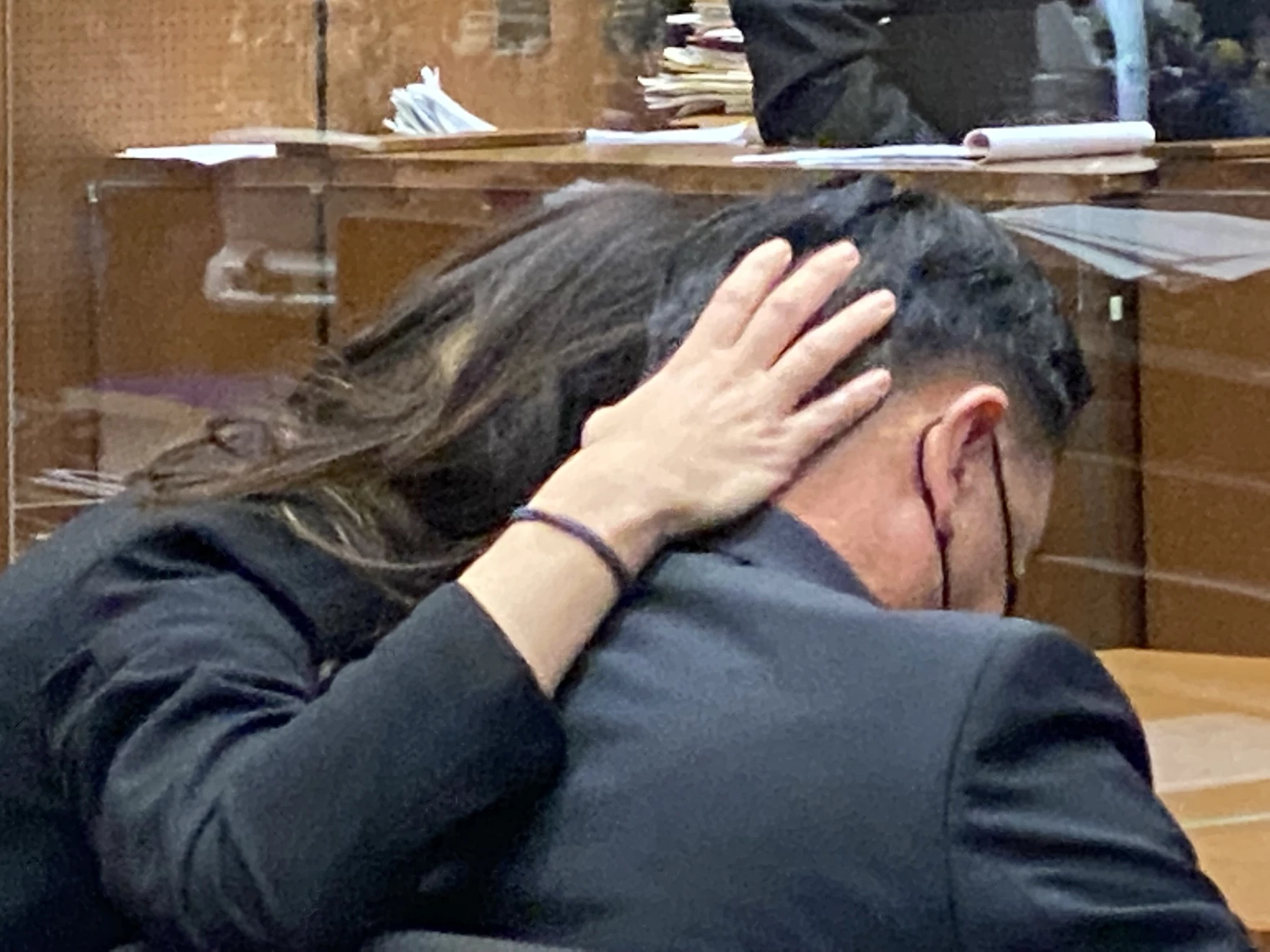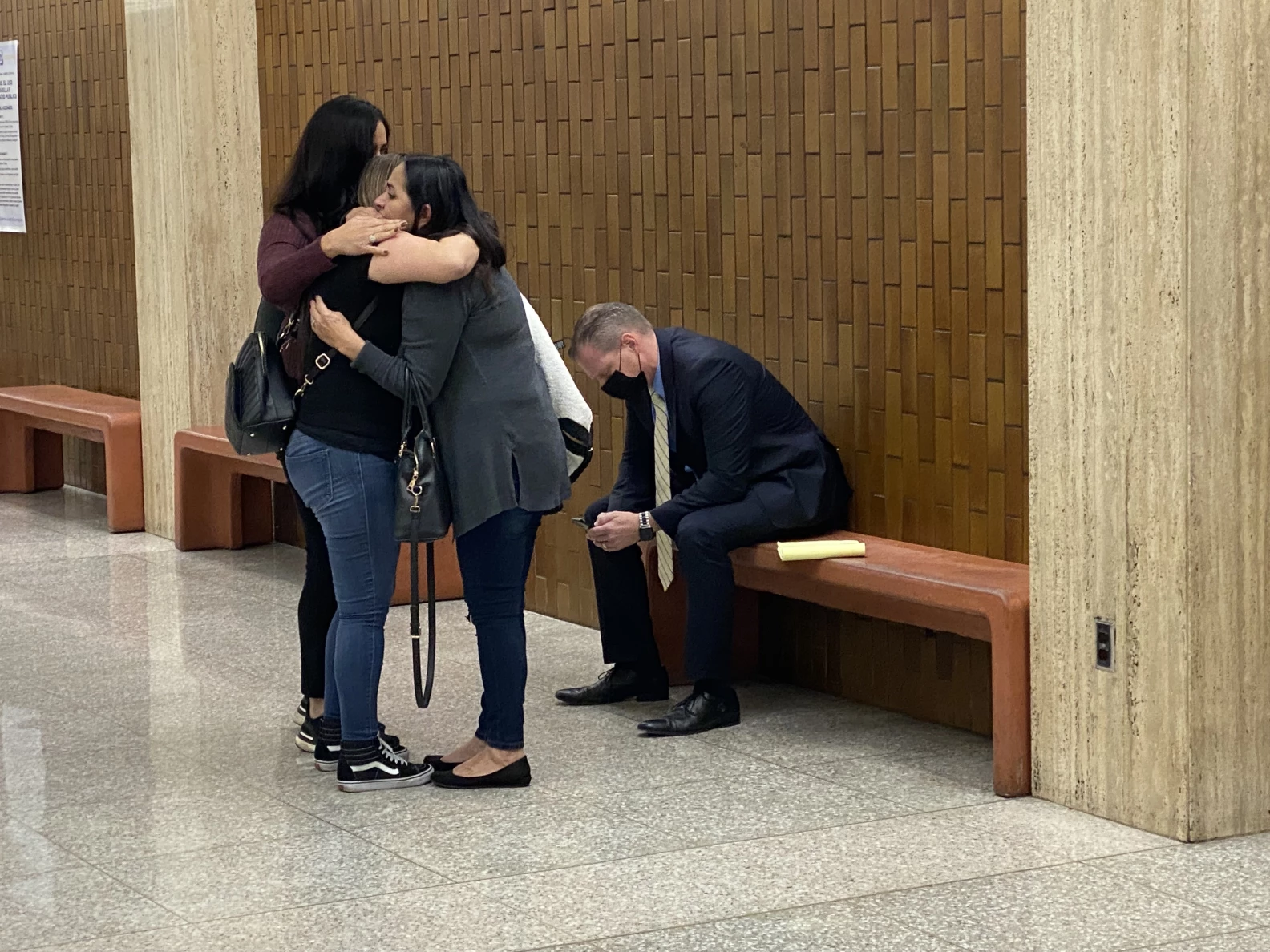By Frank Stoltze
A Los Angeles jury Friday acquitted L.A. Sheriff’s Deputy Luke Liu of voluntary manslaughter in the killing of an unarmed motorist at a Norwalk gas station in 2016.
The prosecution of Liu was highly unusual. At the time he was charged in 2018, Liu was the first law enforcement officer in L.A. County since 2000 to face prosecution in connection with an on-duty shooting. Two more have since been charged.
Some considered the case to be a litmus test of how L.A. juries consider use of force by law enforcement in an era when police are under greater scrutiny. Liu did not testify during the trial. His attorney called just one witness — a use-of-force expert who said the shooting was justified to counter a prosecution expert who said it was not.
Reaction To The Verdict
When the verdict was read, Liu bent forward in his chair and held his face in his hands as one of his attorneys held him. He wiped tears from his eyes as he lifted his head.
The mother of the man Liu shot and killed, Francisco Garcia, and his older sister could be heard in the audience crying. Garcia’s mother, Maria Ruiz Partida, sat through whole trial.
“You know what you did,” Partida said to Liu as she walked out of the courtroom.
Judge Mark Arnold had a different message. “You can put this behind you now.”
“This is the right verdict,” Liu’s attorney Michael Schwartz said. “We feel happy.”
Before the verdict was read, Arnold informed the media that the jury earlier in the day had asked to view video of the shooting on the court’s large screen instead of a much smaller screen in the deliberations room. The judge allowed them to do that, as well as discuss the video as they watched it.
Soon there was a verdict. The video from two security cameras appeared to play a key role in their decision. Jurors were escorted out of the courtroom and were unavailable for comment after the verdict.

Luke Liu bends over in emotion after hearing the “not guilty” verdict. One of his attorneys,
Nicole Castronova, is comforting him after he wipes tears from his eyes.
(Frank Stoltze / LAist)]
The Case Against Liu
The case stemmed from Liu’s killing of Francisco Garcia, 26. The deputy approached Garcia’s car at the gas pump of a 7-Eleven store after determining the vehicle was stolen.
Two security cameras atop the store captured parts of the shooting and were repeatedly played by both prosecutors and Liu defense attorneys during the nine-day trial.
It showed Liu approaching the driver’s side window and Garcia slowly driving away — prosecutors said at speed that was no more than 5 mph.
Prosecutors contended that the videos showed that Liu ran alongside the car and “fired wildly” into it. “He chased him as he was driving away towards the exit,” said Deputy District Attorney Chris Baker of Liu’s actions.
Liu fired seven shots, hitting Garcia four times. Garcia crashed into a sign about 20 feet away.
Baker pointed out that Sheriff’s Department policy prohibits deputies from shooting at moving cars. Under the policy, “firearms shall not be discharged at a stationary or moving vehicle” or its occupants unless deputies are being threatened with a gun or some other “deadly force by means other than the moving vehicle.”
“Francisco Garcia should not have stolen the car. He should not have tried to flee,” Baker told the jury. “But he didn’t deserve to die for it.”
The Defense
Schwartz, who has represented dozens of law enforcement officers involved in shootings, urged the jury to look at the videos differently. While one appears to show Liu chasing after Garcia’s car, the other shows him behind the gas pump, he said
“He only fired [from] the pump … not past the pump,” Schwartz said. One video appears to show Liu with his arm extended in a shooting position away from the pump. Schwartz said it’s not Liu’s extended arm, it’s part of the car window seen on the video.
Schwartz also said the deputy fired after the car struck his knees and because he believed Garcia was reaching for a gun in the backseat.
There was no gun, but legally that doesn’t matter.
Police are allowed to use deadly force if they have a reasonable belief someone poses a threat of great injury or death to them or someone else. Officers must consider the severity of the crime while juries must take into account that officers are forced to make split-second decisions.
Schwartz pointed out officers are not required to see a gun before they shoot — the defense police use in almost all shootings of unarmed people. “If you wait to see a weapon, you’re already dead,” he said.
Schwartz said Liu had been working a double shift since 5 a.m. and was keenly aware that a gang homicide had taken place the night before at the same gas station. The deputy was unsure whether Garcia was a member of the gang who was coming back “to pay homage to his brethren or get revenge,” Schwartz said.
The acquittal was another major victory for Schwartz, who is one of the best known police defense attorneys in the country and a go-to lawyer for sworn officers in Southern California.
Outside the downtown L.A. courthouse, Liu and his two attorneys were surrounded by a half-dozen deputies as they climbed into an unmarked sheriff’s SUV with dark tinted windows and drove away, another unmarked sheriff’s vehicle leading them. Liu, through his attorney, declined to comment.
A Rare Prosecution
Liu was the only officer charged for shooting someone during former District Attorney Jackie Lacey’s eight years in office. Current DA George Gascón, who has promised closer scrutiny of police shootings, already has filed charges against two officers in his first year in office: one from Torrance for assault and a former Long Beach school safety officer for murder.
Gascón also has appointed a special prosecutor and panel to review for possible criminal charges hundreds of police shootings Lacey already determined were legally justified.
More than 1,600 people have been shot by police in the county since 2001. An investigation by this newsroom in 2015 looked at a five-year period from Jan. 1, 2010 to Dec. 31, 2014. We found one in four people shot by police were unarmed.
When he was first charged by Lacey, prosecutors added a special allegation of intentionally discharging a firearm, which would have added 10 years to the maximum sentence of 11 years for manslaughter.
When Gascón took office last year, he dropped the special allegation against Liu under his policy of not pursuing sentencing enhancements or special allegations.
A new California law says police may use deadly force only when “necessary in defense of human life” and after they attempt to de-escalate a confrontation. Because the law took effect in 2020, it did not apply to this shooting.

Francisco Garcia’s mother Maria Ruiz Partida (right) hugs her daughter Adrianna Najar (middle) and Partida’s sister, following a not guilty verdict for the sheriff’s deputy who shot and killed her son. Deputy District attorney Chris Baker, who prosecuted the case, sits on a bench outside the courtroom.
(Frank Stoltze/LAist)
